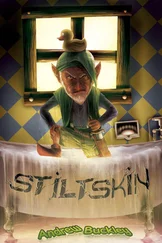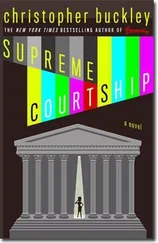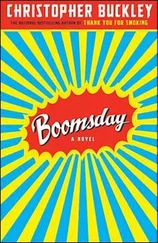Diatri paddled the inflatable Zodiac out of the current, hugging the riverbank, watching with suspicion the logs that floated past him to see if they blinked. The light was fading and he seemed to remember that crocodiles mostly like to eat at night. He paddled until he thought he recognized a small muddy island on the map and put in to shore and set out on foot.
He told himself over and over that the animals, reptiles, birds, monkeys, bats and unspecified things shrieking in his ears were more scared of him than he was of them, though he knew this to be extremely false. Large insects swarmed in and out of his flashlight beam. Eyes the size of bicycle reflectors flashed at him. He kept touching the compass around his neck to make sure it was there. Rivulets of bug juice and sweat ran into his eyes and stung.
He marched in a southwesterly direction for two hours until he smelled smoke. He stopped to get his bearings, blood pounding in his ears. He saw the glow of light off to the south. He took a step forward and felt it, just below his kneecap.
"How do you feel, billonario? "
The face came into focus just as it had months ago on the wall of the cabin on the island.
"Now I see you're still alive, worse."
"You were asking for The Wall Street Journal . When I heard that, I knew you were going to make it. Here, drink some orange juice. Morphine makes you thirsty."
Charley gulped. It was cold and sweet. It tasted wonderful.
"Why did you do it, billonario? "
"Your dope killed someone I loved," said Charley.
"No no," said El Niño dismissively. "Not that. The Manet. The Baudelaire 'Absinthe Drinker.' How could you have done that?"
"You know how Eskimos hunt polar bear? They take a piece of sharp whalebone and bend it inside a chunk of seal fat and freeze it. The bear eats the fat, the bone straightens, the bear chokes."
"Yes," he said with barely controlled anger. "But you can replace seal fat."
"You can replace art."
"It's criminal, what you did!"
"Criminal, you say." Charley laughed. "Well, now." If the bone had not pierced through the bear's throat, perhaps he could at least make it stick in his craw. "The painting's a fake."
"No."
"A copy. You don't think I'd float down into your sewer with the real McCoy? That's back home in the vault."
"You're lying. I had a look before you blew it up. That wasn't a copy."
"Well, now, you won't ever really know, will you?"
El Niño walked toward the door. "Tell me, billonario . All this effort and expense-just for the granddaughter?"
"My way of dealing with grief."
"I still don't understand. No one forced her to inhale cocaine. You're a Catholic. You believe in the consequences of free will. What's the problem?"
"You are the problem."
"What's your understanding of me, billonario? "
"I'm not trying to understand you, son. I'm just trying to kill you."
"But all this effort, you must have done some biographical research."
"I lifted up the rock. You were underneath."
"Do you feel well enough to move? There's something I want to show you."
Charley was on a narrow bed on wheels. El Niño pushed him out into a damp, cement corridor. A man opened a door. It was dark inside, but the air was less humid. Charley heard an electric fan somewhere. He wondered if this was the room where he would die. He wasn't afraid. Was it the morphine? He said a Hail Mary. He'd been sure he was about to die a half dozen times in his life and each time he'd turned to a woman.
"Leave us," he heard El Niño tell his man. Alone in the dark, Charley waited for the fatal bullet or knife thrust. Instead he saw a spotlight brighten gradually on a canvas in front of him.
The Hapsburg emperor stood between his two faithful Mexican generals, Miramon and Mejia. He was wearing a sombrero. The muzzles of the executioners' guns seemed to touch the victims' chests. White smoke poured out. A crowd of spectators peered over the top of the enclosure.
"Do you know what Renoir said when he first saw this? 'A pure Goya, and yet Manet has never been more himself!'"
Charley stared up at the painting. He lost himself in it for a moment. "You rob museums on the side?"
El Niño smiled. "I use a service. A Belgian. He calls himself a 'deaccessionizer.' Rupert Bendinck, do you know him? He has a lot of North American clients."
"No. I pay for mine."
"Oh, believe me, billonario , I paid for this. What do you think? It's magnificent, eh?"
"It's lit wrong."
"You're very blasé. I'm giving you a private viewing of one of the greatest works of art of the nineteenth century. Alas," he sighed, "no longer open to the public. It was in the Stadtische Kunsthalle in Mannheim. Well, anyway, it was wasted on the Germans. Becker, that's German, isn't it? No offense."
"None taken."
"I suppose the Germans wanted it because it's anti-French, or anti-Napoleonic, which to them amounts to the same. You know the story? Louis Napoleon flattered the Austrian Archduke Maximilian into thinking that a nation of Indians and half-castes would accept a Hapsburg for their emperor. Metternich's comment when he heard about the scheme was: 'What a lot of cannon shots it will take to put an emperor in Mexico and what a lot it will take to keep him there.' As soon as your Civil War was over, Secretary Seward complained to Napoleon about the Monroe Doctrine. It was more than that, actually. He threatened him with war. So much for old friends, eh? So Napoleon, lacking his uncle's determination-lacking everything of his uncle, as a matter of fact-withdrew his troops and left poor Max to face Benito Juarez and the brown hordes, with only his two Quislings there, Miramon and Mejia. Max sent his wife, the lovely Carlota, to persuade the Pope to send his troops to intervene. The Pope declined. It was too much for Carlota. She went mad right there in the Vatican. She was the first woman to spend a night there. Do you think she and the Pope…? Manet's comment on the entire sordid affair was to paint the execution in the manner of Goya's 'Third of May, 1808,' in which the first-and true-Napoleon's troops are in the process of slaughtering a bunch of Spanish peons-and to dress the Mexican firing squad in French uniforms! Bravo, eh? He tried to distribute a lithograph of it. Napoleon censored it. There's the power of art for you, billonario ."
"It's still lit wrong," said Charley.
El Niño went on, borne on the current of his passion. "I first saw it as a child. Papa took us to Europe on a Grand Tour. He was worried that his children were turning out insufficiently plutocratic. My sister and I were always hanging out in the kitchen with the servants. In Europe we stayed with Papa's faded noble friends. He thought that would do it, seeing the splendor that was once the Old World. We stayed in these freezing-cold castles that had been in their families since the Bronze Age. You know the kind. They still lived in them but they couldn't afford to heat them. So where did my sister and I spend our time? In the kitchens, with the servants, where it was warm." He grinned. "My father was proud of being descended directly from the Pizarros. Proud of being a Pizarro! My God. When my bad attitude matured into political consciousness, he comforted himself that I was the result of a regressive, Inca gene that one of our ancestors had brought into the bloodline one night rolling around in the mud out by the stables. The truth, really, is that Papa was a greater influence on me than Karl Marx or Mao or Presidente Gonzalo."
"The plan is to bore me to death, is that it?"
"You were an orphan by fate, billonario . I'm one by choice. Is your Catholicism a leftover sentimentality from the Mexican nuns, or does it provide you with the father you never had?"
Читать дальше











